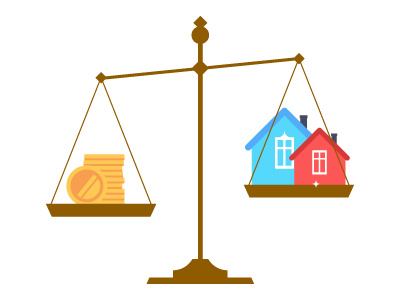How to avoid stamp duty on second home
- When purchasing an additional property, you will be paying the extra 3% stamp duty higher rates on top of the standard rate. You can avoid this by turning the additional property into a primary residence by selling your previous one.
- Certain additional properties are exempt.
- You might still be able to avoid paying tax for second home.
- Use our stamp duty on second home calculator to check how much you'd have to pay.
Since the 1st April 2016, there is an additional rate of stamp duty payable if you are purchasing a property and own an interest in another property anywhere around the world (not just the UK).
How can I avoid stamp duty on second property?
To avoid the second home stamp duty, you can exclude anyone with an interest from the legal title, use a joint mortgage sole proprietor mortgage, transfer from a partnership to a limited company or purchase for less than £40,000.
Exclude anyone from the legal title who owns an interest in another property
If you are married, it doesn't matter whose name is on the title. As long as you or your spouse own an interest in another property, the additional rate is applicable - SDLT - higher rates for additional dwellings: purchasers with a spouse or civil partner.
Joint Mortgage Sole Proprietor mortgage
This allows you to help your child, for example, purchase a property. You will be named on the mortgage but not the legal title, allowing you to avoid paying stamp duty on second homes.
Transfer the property from a partnership to a limited company
If your property is part of a partnership, you can transfer it to a limited company without having to pay stamp duty on second home. We explain this further in our article - How do I transfer a partnership to a limited company with no SDLT?
Buy a property for under £40,000
Stamp duty higher rates only apply to properties over £40,000.
The challenge with the above is that if your intention is to have an interest in the property and you already own another property, then second home stamp duty is applicable. You can, however, draft a loan agreement to protect your investment, which isn't considered an interest in the property and as such doesn't attract the additional rate of stamp duty.
Whilst this is how to avoid second home stamp duty, if your intention is to have a benefit/interest from the property, then there is no way to avoid second home stamp duty if you own another property and have no intention of selling it to make the new property your main residence.
Looking for a Stamp Duty loophole?
There isn't a "loophole" to avoid paying Stamp Duty, but there are ways you can effectively reduce the amount you pay on a property purchase or a transfer.
Which second homes are exempt from stamp duty?
You can avoid paying stamp duty on second homes if your property is:
- worth less than £40,000
- easy to move around (i.e. boats or caravans)
- a combination of residential and non-residential (building with upstairs flat and shop on the ground floor)
How much stamp duty do you pay on 2nd property?
The stamp duty higher rate is an additional 3% payable on top of the normal rate. For example, if you're buying a property over £250,000, you will pay the standard 5% + the additional higher rates of stamp duty 3%. This means your stamp duty cost will be 8%. Use our second home stamp duty calculator to check how much it will cost you.
| Property Price | Standard Rate of Stamp Duty | Additional Home Rate (updated post Oct 2024 budget) | Non UK Resident Rate |
| £0 - £125,000 | 0% | 5% | 2% |
| £125,001 - £250,000 | 2% | 5% | 2% |
| £250,001 - £925,000 | 5% | 10% | 2% |
| £925,001 - £1.5 million | 10% | 15% | 2% |
| Over £1.5 million | 12% | 17% | 2% |
Second Home Stamp Duty Calculator
When do you pay Stamp Duty Land Tax?
If any party acquires an interest or a greater interest in land, stamp duty land tax (SDLT) or land transaction tax (LTT) will be payable by reference to any chargeable consideration given for it. Chargeable consideration is defined in the Finance Act 2003, Schedule 4, Stamp duty land tax: chargeable consideration and confirmed by HMRC with examples.Can you claim back stamp duty on second home?
If any of the parties purchasing a property own an interest in any other property around the world, then an additional 3% SDLT is payable on top of the normal rate. You don't have to pay it if you're just selling your main residence and buying a new main residence. If you are forced to pay it, however, once you sell the previous main residence, you can claim a 2nd home stamp duty refund.£199 INC VAT
How to avoid stamp duty on second home with a loan?
As we have seen above, if you have an interest in the property, whether at the start, during or at the end, then you will have to pay the second home stamp duty. To understand what you need to do, we must first understand what is an interest.
A chargeable interest is defined very broadly in the Finance Act 2003 Section 48 as:
- 1
(a)an estate, interest, right or power in or over land in England, or
(b)the benefit of an obligation, restriction or condition affecting the value of any such estate, interest, right or power,other than an exempt interest.
It goes on to confirm what isn't classed as a chargeable interest:
- 2
(a)any security interest;
(b)a licence to use or occupy land;
- 3
In subsection (2)—
(a)“security interest” means an interest or right (other than a rent charge) held for the purpose of securing the payment of money or the performance of any other obligation;
This would mean that a loan can be given and repaid and it does not give rise to an interest in land and as such you can avoid stamp duty on second home.

Get a loan agreement to avoid second home stamp duty
Our solicitor can help draft a loan agreement for a Joint Mortgage Sole Proprietor arrangement. The loan agreement takes 24 hours to draft and can include interest terms and when to repay.Lending money to someone else? £399 INC VAT | Borrowing money from someone else? £399 INC VAT |
Andrew started his career in 2000 working within conveyancing solicitor firms and grew hands-on knowledge of a wide variety of conveyancing challenges and solutions. After helping in excess of 50,000 clients in his career, he uses all this experience within his article writing for SAM, mainstream media and his self published book How to Buy a House Without Killing Anyone.
Caragh is an excellent writer and copy editor of books, news articles and editorials. She has written extensively for SAM for a variety of conveyancing, survey, property law and mortgage-related articles.









